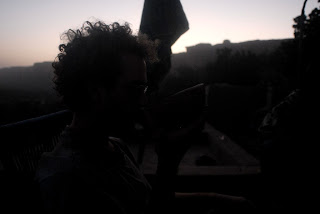 As my friends in Kankan like to point out, "Soka li di," I'm a villager. Lansine and I are hanging, literally, in some vines up in a tree. As always, he strikes a karate pose. And it's not just him, you see the videos: all the kids here strike karate poses whenever I pull out a camera. Seeing as how it's all they see on TV I can't really blame them, but it is a bit odd.
As my friends in Kankan like to point out, "Soka li di," I'm a villager. Lansine and I are hanging, literally, in some vines up in a tree. As always, he strikes a karate pose. And it's not just him, you see the videos: all the kids here strike karate poses whenever I pull out a camera. Seeing as how it's all they see on TV I can't really blame them, but it is a bit odd. My stitches. I was worried they were going to heal with a couple holes leading into my hand muscles, but my good old body kept spitting out new bursts of skin until all the holes filled in. This is about as bad a job as you could ever want done, though. Still, it's better than the clothes my village tailor turns out for me.
My stitches. I was worried they were going to heal with a couple holes leading into my hand muscles, but my good old body kept spitting out new bursts of skin until all the holes filled in. This is about as bad a job as you could ever want done, though. Still, it's better than the clothes my village tailor turns out for me. I've made toh before - though I've never done all the steps at the same time. Nantine (left) was so proud she wanted me to take a photo, but Bourdelaye and Wounmare decided they had to pretend to eat the toh. I just took the picture instead of waiting for the battle to stop.
I've made toh before - though I've never done all the steps at the same time. Nantine (left) was so proud she wanted me to take a photo, but Bourdelaye and Wounmare decided they had to pretend to eat the toh. I just took the picture instead of waiting for the battle to stop. The first few mango rains showed that yes, my roof still leaked; it didn't magically stop leaking since last rainy season. Well, Madi and I climbed up on the roof to fix it and now my bed is back in its old spot. No leaks! Also, my roof is now capped with an old bike tire; no more twisted vines for me; I'm moving up in the technology world.
The first few mango rains showed that yes, my roof still leaked; it didn't magically stop leaking since last rainy season. Well, Madi and I climbed up on the roof to fix it and now my bed is back in its old spot. No leaks! Also, my roof is now capped with an old bike tire; no more twisted vines for me; I'm moving up in the technology world. As a friend pointed out to me, it's a sad world we live in when 50 Cent is quotable. I told Fanta what her shirt said and she thought it was hilarious. It sort of holds true here, too. Everyone is trying to get rich and eventually we all die.
As a friend pointed out to me, it's a sad world we live in when 50 Cent is quotable. I told Fanta what her shirt said and she thought it was hilarious. It sort of holds true here, too. Everyone is trying to get rich and eventually we all die. Lansine, Madi, and I went out to get raffia. I was making a bee hive and they were selling it to the big city folks. This is right after Lansine jumped out of the vines (see above photo).
Lansine, Madi, and I went out to get raffia. I was making a bee hive and they were selling it to the big city folks. This is right after Lansine jumped out of the vines (see above photo). And after about five seconds, they start giving me karate poses. Naturally.
And after about five seconds, they start giving me karate poses. Naturally.

































